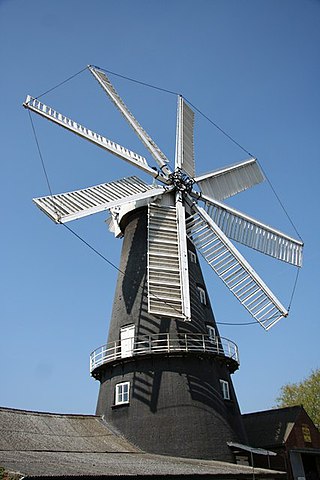
Heckington Windmill is the only eight-sailed tower windmill still standing in the United Kingdom with its sails intact.
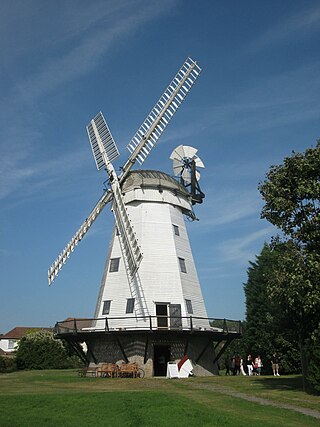
Upminster Windmill is a Grade II* listed smock mill located in Upminster in the London Borough of Havering, England. It was formerly known as Abraham's Mill and was in Essex when built. It has been restored and is a museum open to the public at selected times.

Outwood Windmill is a Grade I listed post mill in Outwood, Surrey. Built in 1665 by Thomas Budgen, a miller from Nutfield in Surrey, it is Britain's oldest working windmill. It was one of a pair after 1797, alongside a smock mill that had the tallest smock tower in the United Kingdom until its collapse in 1960.

Denver Windmill is a Grade II* listed tower mill at Denver, Norfolk, England. In March 2010, there were about 374,000 list entries of which 5.5% were Grade II* and even fewer were superior.

Great Bircham Windmill is a Grade II listed tower mill in Great Bircham, Norfolk, England.

Billingford Windmill is a grade II* listed brick tower mill at Billingford near Diss, Norfolk, England which has been preserved and restored to working order. As of June 2009, the mill is under repair, with new sails being made.

Burnham Overy Staithe Windmill is a Grade II* listed building tower mill at Burnham Overy Staithe, Norfolk, England which has been converted to holiday accommodation.

Caston Tower Windmill is a grade II* listed tower mill at Caston, Norfolk, England which is under restoration. The mill is also a scheduled monument.

Baker Street Mill is a grade II listed smock mill at Baker Street, Orsett, Essex, England which has been part adapted to residential use on its lower two floors only.

Terling Windmill is a grade II listed Smock mill at Terling, Essex, England, which has been converted to residential use.

South Ockendon Windmill was a Smock mill at South Ockendon, Essex, England which collapsed on 2 November 1977.

Stock Windmill is a grade II* listed tower mill at Stock, Essex, which has been restored.

Thelnetham Windmill, also known as Button's Mill is a Grade II* listed tower mill constructed of brick. The windmill is located at Thelnetham, Suffolk, England. It was built in the early nineteenth century to grind wheat into flour. Thelnetham windmill worked by wind power until 1924, latterly on two sails, after which it became derelict.
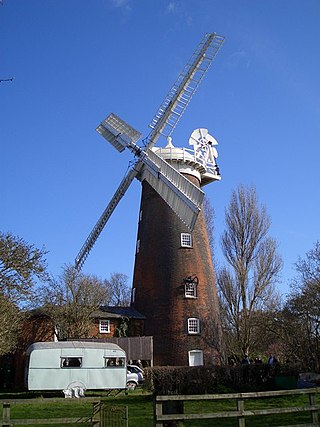
Buttrum's Mill or Trott's Mill is a Grade II* listed tower mill at Woodbridge, Suffolk, England, which has been restored to working order.

Aslacton Mill is a Grade II listed tower mill at Aslacton, Norfolk, England which is derelict.
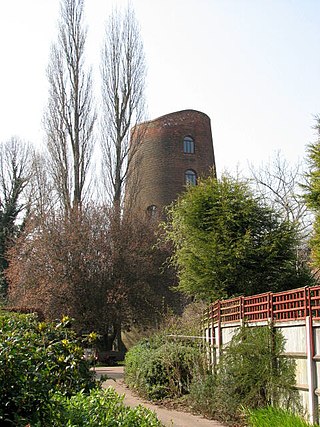
Cawston Road Mill is a tower mill at Aylsham, Norfolk, England, which has been truncated and converted for use as a holiday home.
Mill Lane Mill is a Grade II listed tower mill at Carbrooke, Norfolk, England which has been conserved with some machinery remaining.

Jay's Mill, Button's Mill or Victoria Road Mill is a tower mill at Diss, Norfolk, England which has been truncated and converted to residential accommodation.
Kenninghall Road Mill is a Grade II listed tower mill at East Harling, Norfolk, England which has been converted to residential accommodation.
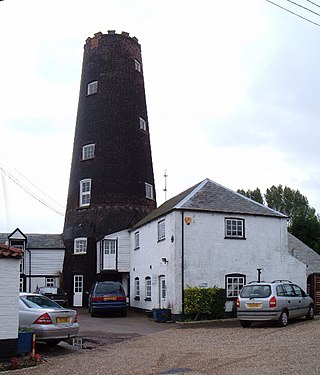
For the Gayton Windmill now in Merseyside see Gayton Windmill, Cheshire




















